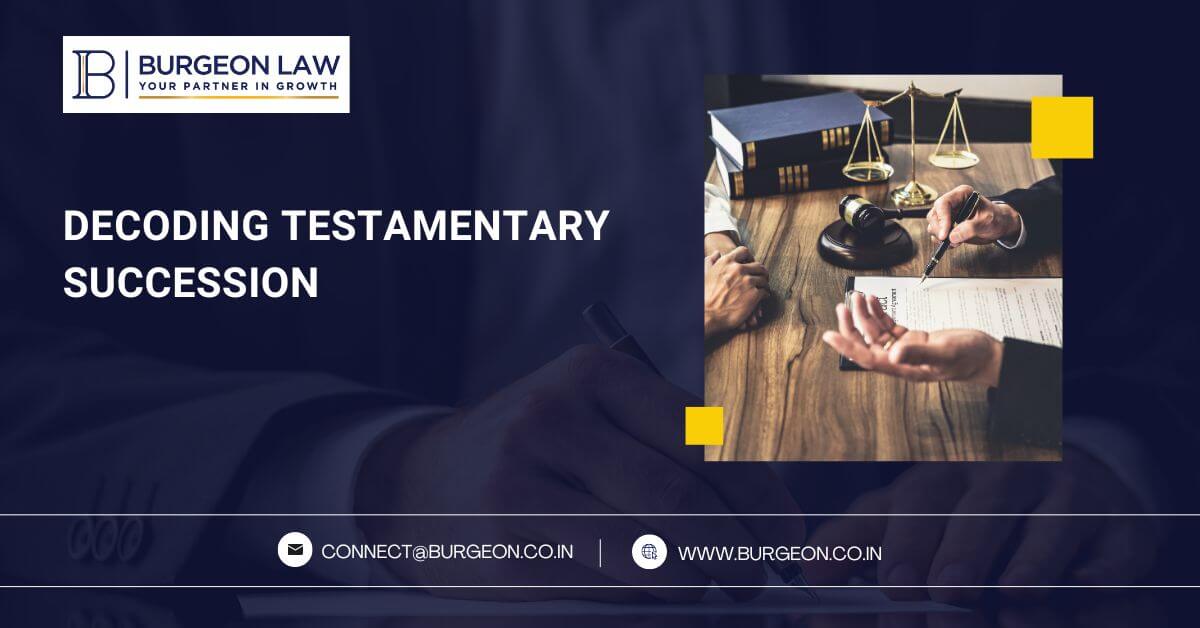Table of Contents
ToggleIntroduction
- Succession is the legal process by which the assets of a deceased person are transferred to their legal heir. Testamentary succession specifically pertains to the succession of a person’s assets after their demise in accordance with the provisions of a legally executed Will. The legal framework governing essential requirements and execution of a valid Will in India is primarily governed by the Indian Succession Act, of 1925 (“Succession Act”).
- The Succession Act defines ‘Will’ under section 2 (h), as “the legal declaration of the intention of a testator with respect to vesting of his property which he desires to be carried into effect after his death”. In simpler words, a Will is the legal document executed by a testator during his/her lifetime, for devolution of his/ her assets after their demise and such Will can only be revoked during his/ her lifetime.
Essential requirements for executing a valid Will
The Succession Act outlines several essential elements that must be adhered to for preparation of a Will:
- Mental Capacity and Age Requirement: To create a valid Will, the individual must be of sound mind and at least eighteen years old. This requirement therefore excludes individuals who are of unsound mind or minors from creating a Will.
- Incapacity Due to Intoxication or Illness: A person unable to make a valid judgment due to intoxication or illness, where understanding the consequences of their actions is impaired, is prohibited from creating a valid Will.
- Absence of Force, Coercion, or Threat: Any part of a Will that has been compelled through force, coercion, or threat, or has not been drawn with free consent, is unenforceable by law.
- Listing of Assets: The Will must include a comprehensive list of all assets owned by the testator, such as property, savings, shares, stocks, bonds, and other financial assets.
- Division of Assets: Once the assets are listed, the Will should articulate a clear and unambiguous plan for the division of these assets. In cases where assets are designated for minors, it is mandatory to appoint a custodian for their management.
- Signing and Witnessing: Once the Will is drafted, it must be signed by the testator, indicating the date of signing. Additionally, the Will must be attested by two witnesses who simply need to confirm that the testator signed the document in their presence. The presence of witnesses adds credibility to the Will in the eyes of the law, making this step mandatory.
Types of Will in India
The Succesion Act recognizes two types of Will, unprivileged and privileged Will. A privileged Will is one that can be made by members of the armed forces employed in an expedition or engaged in actual warfare and can be made in oral form as well. A relaxation of formalities has been envisaged for them considering the inherent dangers and possibility of sudden death coupled with the lack of time and means to deliberately frame a written will. An unprivileged Will on the other hand is the Will that can be created by every person other than those who can create a privileged Will.
Is it necessary to register a Will?
- Section 17 of the Indian Registration Act, 1908 (“Registration Act”) provides a comprehensive list of documents that must be registered. Notably, Will is not explicitly included in the list of documents that require compulsory registration under Section 17 of the Registration Act. In fact, according to Section 18(e) within the same Registration Act, a Will is acknowledged as an instrument for which registration is optional.
- This raises the question of whether the individual creating the Will gains any advantages by choosing to register it under Section 18 of the Registration Act. The registration process essentially establishes the existence of the Will, attributed to a specific individual, within the Registrar’s office. Additionally, it signifies the acknowledgment by the Will-maker of the execution of the document. Therefore, the act of registration imparts a greater level of authenticity to the Will than an unregistered Will which can be susceptible to challenge.
Can modifications be made to a registered Will, either partially or entirely, after its execution?
- Section 62 of the Succession Act explicitly states that a Will can be revoked or altered by its creator at any time when they are competent to dispose of their property through a Will. Moreover, the Succession Act defines a ‘Codicil’ as “an instrument made in relation to a Will, and explaining, altering or adding to its dispositions, and shall be deemed to form part of the Will”.
- It is essential to note that a Will becomes effective only after the testator’s death, conferring no rights to any person until then. Consequently, the testator has the complete freedom to discard the previously executed Will entirely and draft an entirely new Will or modify specific portions of the original Will. Therefore, even after the registration of the Will, the testator retains the right to amend or revoke it. In essence, the testator can make changes or revoke the Will even after it has been registered, without any impact on this prerogative.
Conclusion
In conclusion, the creation of a Will in India is a critical financial decision that should be prioritized despite its perceived complexity. A well-drafted Will ensures the testator’s intentions are known and adhered to, minimizing the potential for disputes and facilitating a smooth asset transition. Taking a proactive approach to will creation contributes to effective estate management, family harmony, and the preservation of one’s legacy.

